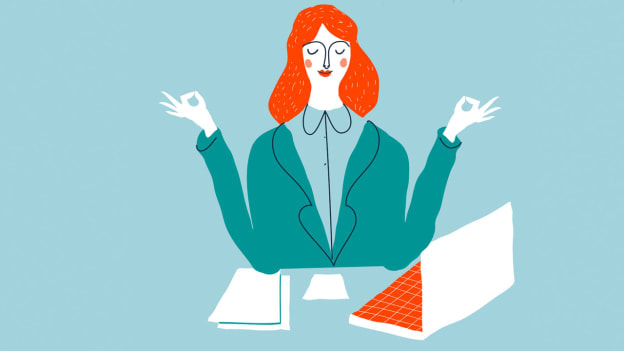COVID-19: Here's how you can keep your mental health safe

Hopelessness…Helplessness…Insecurity…If this is what you are experiencing right now, it is absolutely natural. COVID-19, after all, is the biggest challenge that we humans have ever faced. Many of you might be facing a possible pay cut, loss of bonus, perhaps even a loss of job. For young professionals at the altar of their careers with campus placements, future looks even more bleak. Workplace mental health and well being could be at a tipping out and needs to be addressed urgently.
During these extraordinary times, we were interested in studying the types of psychosocial stressors that we Indians are experiencing as a result of COVID-19 and the lockdown. We designed an on-line survey with a large pan-India sample of more than 1000 participants. Using a statistical technique known as factor analysis to the data obtained, we found that stress due to COVID-19 was made up of five components. I have coined the acronym ‘VIRUS’ for it. Let me explain these stressors and also give some practical tips of how to deal with them.
- Vexation from others: On one hand, we are frustrated with “covidiots” who aren’t maintaining social distancing and are contributing to high rates of transmission, on the other hand our overzealous well-wishers who keep sending all kinds of advice are equally irritating. News channels, hammering negative stories also lead to panic and anxiety. Considering that India is the biggest market of WhatsApp, memes, jokes and even false news circulated so readily leads to annoyance. My advice: filter out social media. You certainly do not need to know how many COVID cases have been detected in USA or even India on an hourly basis. You may consider opting out of WhatsApp groups that are counterproductive or at least mute their notifications. Instead, talk to similar minded people.
- Immediate concerns: Managing finances is the most immediate concern right now. The fear of getting infected with COVID-19 is not as high as economic worries. At the risk of sounding pessimistic, it’s time to go frugal. If you have survived a month without a vacation, a fancy gadget, new designer clothes, you certainly can cut back on your spending. Be prepared for losses of up to 30% and corresponding reduction in expenditure and you won’t be disappointed. Think of what do you need to do to survive for the next 3-6 months. Be prepared to modify your goals and targets.
- Routine disruption: Man is a slave to his own habits. Any change produces anxiety. People who are conditioned to conform to routine rituals on an everyday basis are feeling threatened. Since we are all working from home, it is very tempting to wake up late and work from your bed on your laptop. Please please do create and maintain a routine. Get dressed to virtual work. Try to keep a desk in some corner of the house, instead of your cozy bed. Take breaks, have meals at proper times, log off from work after office hours and most importantly maintain your sleep cycle. Exercise and stay active. When you exercise, your body releases endorphins, dopamine, norepinephrine and serotonin- each of which play an important role in mood regulation. Exercise may also help distract you from your worries and improve your confidence. As much as you miss your gym, walk in the park or a jog, that’s not an excuse to become a couch potato. Improvise and work out from your home.
- Uncertainty about the future: Especially for those of you who thrive on structure and plan their lives, this is an exceptionally difficult time. But remember, inside every crisis lies an opportunity. Today, the world is in pursuit of new business models. India is a youthful nation. We are known for our innovative zeal. Will China’s loss be India’s gain? Think of new business ideas and plan. Keep a positive attitude. Women may be at a special advantage when it comes to working virtually. For years women have faced the glass ceiling due to fewer opportunities to network professionally over drinks and meals post work. Working from home gives a level playing field to both genders. It means goodbye to sexual harassment at work, ease of monitoring young children at home- something that women had been hoping for. Seek the opportunity, ladies!
- Systemic stressors: We are also worried about systemic stressors like the fear of economic recession, the plight of those less privileged, and the response of the Government. While we have no direct control over these, our reaction to them will determine our mental health and well-being. For instance, do you get affected by reading news reports of migrant workers walking all the way back to their villages and collapsing on the way? Daily wage workers not having enough food? Do you, at times, feel guilty about your own position of privilege? It’s time to do something about it. Just as we expect our companies to engage in Corporate Social Responsibility, it is time that we show our humanitarian responsibility towards our fellow beings. Instead of posting pictures of exotic dishes that you are making in the lockdown, post pictures and positive news about people helping others. Turn altruistic yourself. After all, acts of kindness, giving, and charitable deeds produce endorphins, that will not only make you feel good, but boost your immune system. It can even help you live longer and happier.
Physical lockdown must not be overpowered by the psychological lockdown. Build new skills that will help in the new ‘normal’- resilience, emotional quotient, adversity quotient, ability to not get distracted when working on line, finding meaning in solitude, appreciation for the mundane, social connectedness during social distancing, and care for our families, our communities and our planet. That’s the least we can learn from this pandemic!
















